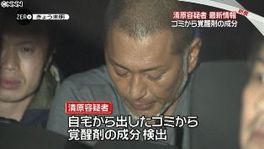
Kiyohara, 48, is originally from Kishiwada City in Osaka Prefecture, and over his long career (22 years in the pro league, playing for Seibu Lions, the Giants, and then the Orix Buffalos) he established himself as a slugger, albeit one with some issues (his batting average over his career was .272, and he still leads the Japanese Professional Baseball League in the most strikeouts at 1955, and most hit by pitches at 196).
Kiyohara’s reputation was cemented during his days playing for PL Gakuen High School, where over his three years at the school he appeared in 3 consecutive summer national high school baseball championships at Koshien Stadium in Hyogo Prefecture and hit a record 13 home runs, a feat that has yet to be equaled. Kiyohara was then directly drafted from high school into the Seibu Lions and made his debut for the team in 1986.
After retiring in 2008, Kiyohara used his celebrity status to pen articles for Nikkan Sports and made numerous television appearances on variety programs and in product commercials, while also lending his voice in the commentary box at various pro-league games.
In 2014, the first signs of trouble emerged when the Shukan Bunshun magazine reported that Kiyohara had been suspected of indulging in illicit substances, quite possibly as a consequence of his attempting to deal with his Type-2 Diabetes for which he was hospitalized in early 2014. Kiyohara initiated legal proceedings against Shukan Bunshun, yet later dropped his libel case. While this was occurring, Kiyohara used his spare time to get tattoos on his shoulder and foot (which itself is a social taboo in Japan, and is a practice that it generally frowned upon). Kiyohara’s erratic behaviour resulted in a divorce from his wife in September 2014, after which he lost custody of his two sons.
All this came to a head last week when Tokyo Metropolitan Police raided Kiyohara’s apartment and found 0.1gms of methamphetamine (which Kiyohara admitted was his) (J). Kiyohara was arrested at the scene, not only for possession of narcotics but also on suspicion of having associated with organised criminals (the Metropolitan police apparently tracked Kiyohara to Gunma Prefecture the day before his arrest to confirm this and to trace the route of his drug supplies) (J).
In many respects, this is yet another sad tale of a former sports legend falling on hard times after their retirement and, devoid of any set of skills apart from their sporting prowess, they find it especially difficult to adjust to a life out of the limelight. Kiyohara had a fan following similar to that of Nagashima Shigeo (J), hence his fall from grace has hit many of his former teammates and friends (not to mention his fans) hard.
While it is not unusual for sports personalities to occasionally be their own worst enemy, in the case of Kiyohara it appears that his afflictions might stem from a deeper level of dissatisfaction and despair that he has yet to fully face. It may be possible for Kiyohara to make a comeback, particularly to the world of either radio or television, but it will be a long, slow process, and he may not have the temperament for it. The whole issue of illicit drug taking doesn’t help his case (this is in contrast to entertainers that have affairs. After a period of “remorse” (usually a year or so), they gradually start appearing on Japanese television once again, albeit as a source of mirth for their co-stars.)
It`s not too late, however, for Kiyohara to find redemption. The world of entertainment is a fickle thing, and Kiyohara`s former stature and popularity may serve him in good stead in the long run.
 RSS Feed
RSS Feed